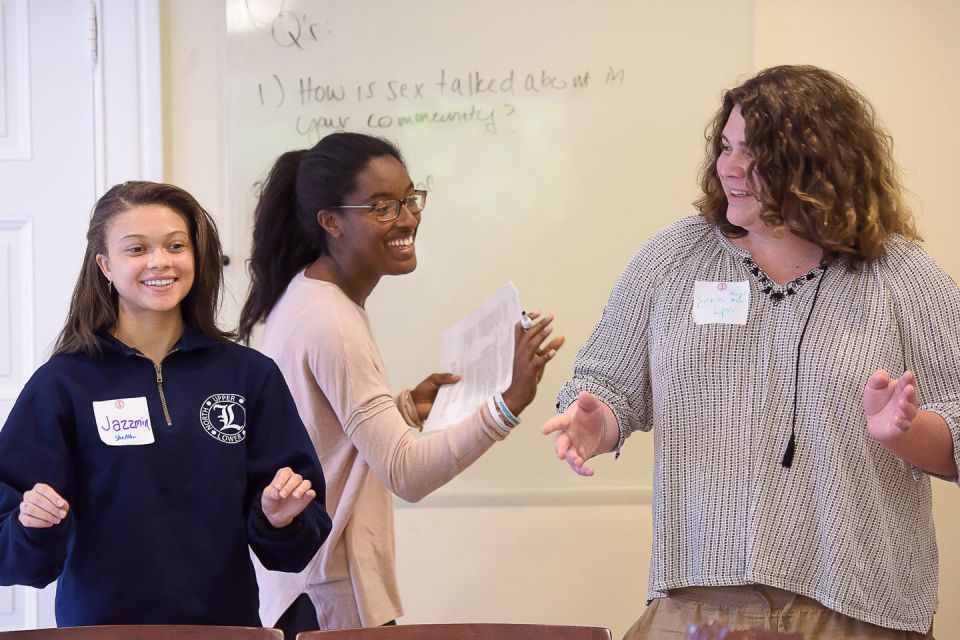During autumn quarter, Stanford undergraduates trained as peer educators will lead workshops designed to introduce first-year students to the intrapersonal and interpersonal skills needed to cultivate a more resilient, supportive and safe Stanford community.

Undergraduates Jazzmin Williams, Lola Tijani and Erika Lynn Kreeger lead a practice training session with a group of peer educators as part of the Stanford Anti-Violence Educators (SAVE) program. (Image credit: L.A. Cicero)
The workshops are part of the new SAVE: Stanford Anti-Violence Educators program, a sexuality, consent and interpersonal violence prevention program launched last spring by the Office of Sexual Assault & Relationship Abuse Education & Response (SARA) in collaboration with the Sexual Assault Prevention Committee of the Associated Students of Stanford University (ASSU).
SAVE’s mission is threefold: to help students better understand and connect with each other; to give students better tools for navigating sexual and intimate relationships; and to contribute to a culture of consent and respect.
New undergraduates are required to attend one of SAVE’s 90-minute workshops, which will be held in their dorms during the third to eighth weeks of autumn quarter.
SAVE is one of several educational initiatives designed to engage incoming students in conversations about the need for affirmative consent, the reality of sexual violence on campus and the collection of resources available to all students. Among the others:
- Before they arrive on campus, all incoming students are required to take an online educational course, Haven: Understanding Sexual Assault, which is intended to help them learn more about sexual and relationship violence prevention, and their role in creating and maintaining a more respectful campus culture.
- During New Student Orientation, all incoming students are required to participate in “The Real World: Stanford” program, which addresses situations they might encounter at college around well-being, health and safety. During the program, incoming students will learn more about Stanford’s community values, campus resources and how to take care of themselves and each other. They will learn that everyone in the campus community can thrive at Stanford, and that their choices make a powerful and positive difference.
- First-year and transfer students are also required to attend “Beyond Sex Ed: Consent & Sexuality at Stanford,” an evening program held the second week of autumn quarter. The program, which features stories from current students, aims to create a fundamentally different climate around sexuality, relationships, intimacy, consent and community at Stanford. Its underlying philosophy is that in order to address sexual violence systemically, everyone must start conversations that focus on individual narratives, which reflect the larger systems of culture surrounding us.
SAVE program created by and for students
Stanford student leaders Tanvi Jayaraman, ’16, and Hannah Long, ’16, the co-chairs of the Sexual Assault Prevention Committee of the ASSU – initiated the program last spring.
A team of Stanford staff and students drawn from all over campus developed the preliminary curriculum for SAVE during a daylong brainstorming session. After Stanford approved the program, the student leaders solicited applications, interviewed candidates and selected the first cohort of peer educators.

Peer educators participate in a training session. They will lead autumn quarter workshops designed to introduce first-year students to the skills needed to cultivate a more resilient, supportive and safe community. (Image credit: L.A. Cicero)
Last spring, staff from SARA and Wellness and Health Promotion Services at Vaden Health Center finalized the curriculum and led training sessions for peer educators.
The workshops will feature the animated video Tea & Consent and one-on-one and small-group activities designed to spark conversation, interaction and self-reflection.
“We want students to have the opportunity to build skills and practice what it feels like to communicate their needs and wants, and to understand and communicate their boundaries,” said Grace Poon, coordinator of prevention education and training at SARA.
Brianna Booth, director of positive sexuality, design and development at SARA, said a large part of the curriculum is devoted to recognizing the diversity of experiences, communities and identities within the student body.
“Every student comes from their own community with different values and beliefs and experiences,” Booth said. “These backgrounds inform their identities, which affect the way they interact and relate with one another. In the workshops, students will have the opportunity to reflect on these various influences together, opening up dialogue and fostering awareness of their community here at Stanford.”
Getting on the same page
When Michael Kim, one of SAVE’s peer educators, served as a resident assistant in a freshman dorm last year, he realized that some students had never discussed concepts related to sexuality, relationships, intimacy and consent before arriving at Stanford.
“We need to create a benchmark for what we expect Stanford students to know about consent and sexuality,” said Kim, a senior majoring in English and computer science. “Only once we’re all on the same page can we begin to change the culture around sexual encounters at Stanford.”
Kim said one of the most important messages he hopes to convey to new undergraduates is that each person’s sexuality is unique and that college can be a valuable time to discover one’s sexuality.
“Once a student understands that no two sexualities are the same, the idea of consent is a must, because you cannot assume what someone else is comfortable with,” Kim said. He hopes first-year students will “see themselves” in the peer educators facilitating the program.
“We hope the students will relate to us and trust our judgment, because we’ve walked down the path they are just beginning to walk,” Kim said. “When they hear us say, ‘I wish I had learned about these concepts when I arrived as a freshman,’ I hope they see our genuine intentions and truly open up.”